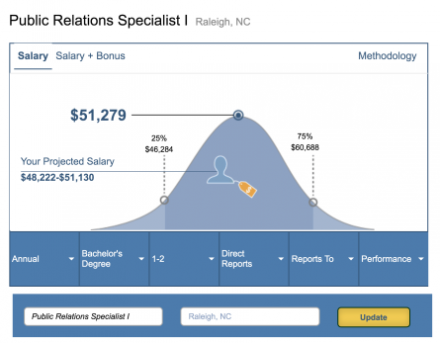You get the job of your dreams, you accept your employer's offer...but how do you negotiate the salary? Ross Wade says that researching salaries in that field, costs of living and budgetary issues should be equal aspects of the interview preparation. Make sure you are getting the job you desire with the salary you desire.
This is part of a series of columns from the Student Professional Development Center offering industry insights and career guidance.
By: Ross Wade, senior associate director of career services, School of Communications
I remember getting a call from my first employer informing me they wanted to hire me – I was SO EXCITED. The call lasted about 60 seconds, and it went something like:
Employer: Ross, we are thrilled to offer you the ______________ position with us. Do you accept it?
Me: Yes! Thanks so much!
Employer: When can you start?
Me: Is June 1 okay?
Employer: June 1 is fine. Our salary offer is $___________. Does that sound okay?
Me: Um…yes, that sounds fine.
Employer: I’ll follow up next week with the contract and other info. Glad to have you on board.
I hung up the phone and thought, “Oh no. I think I could have gotten a higher salary. Why didn’t I think about and prepare for this part of the job search?!” I was so caught in the moment and unprepared to talk salary that I automatically said yes. Never do this.
Many new professionals (fresh out of college) are doing interviews, reviewing job offers, and sending the dreaded “salary request.” The salary request question seems to send folks for a loop, and I can see why. Job seekers spend so much time updating self-marketing materials, networking, and preparing for interviews, that they don’t take the time to think about their worth. This is very important.
So, let’s step through the process, shall we?
Step One: Research
It is important to know average salaries for your industry and your region – a public relations assistant account executive will make less in Gibsonville, NC than in New York City. CNN has a great cost of living calculator where you can see how far $40,000 a year will get you in Gibsonville vs. New York. It is important to understand that you’ll make more for the same position in New York City because it costs more to live there.
Below are some great resources for researching salaries by company/organization or by region:
At Glassdoor.com you can click on the “salary” tab and search by the company – they have TONS of companies, including colleges and universities, to search. Salary.com allows you to search for salaries by city, state. Jobs in digital or social media may be a bit more difficult to nail down, but you can find similar types of jobs and “guestimate” an equal salary.
Ask around. Hopefully, informational meetings have been a large part of your networking process. Reach out to those in your network and ask them to provide salary ranges for positions in their field. Asking for a range rather than a specific salary will make your contact more comfortable providing you information.
Step Two: Set your Boundaries
It is very important that you decide a desired salary as well as your rock bottom salary. These numbers will be chosen based on your research, cost of living of the region, and other budgetary issues (e.g. college loans). Some of the best advice I ever got was, “never take a salary you’re unhappy with – you’ll start your job not only angry with the company, but angry with yourself, and that is no way to start anything.” Makes sense/cent$ right?
Step Three: Sending your Salary Request
I always think it is a good idea to send a range rather than a specific amount. $5,000 to $10,000 is a good range. So, if I were sending my salary request for an assistant account executive position in Raleigh, NC, I would say my range is between $48,000 to $55,000 – and this range would be based on my research (e.g. the equivalent job on Salary.com would be a public relations specialist 1 with 1-2 years of experience and a bachelor’s degree).

Giving a range allows some wiggle room for you and the employer. Remember to never go beyond that rock bottom salary you gave yourself! If an employer really wants you, they will be willing to negotiate.
You don’t want to start your career making less than you are worth…it is really hard to catch up, and you don’t want to spend the rest of your career regretting your first salary. Know your worth, do your research, and get paid what you deserve!



